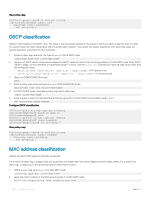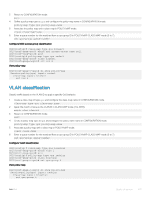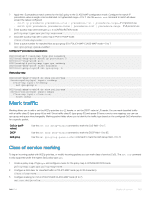Dell S5148F-ON OS10 Enterprise Edition User Guide Release 10.3.2E-R2 - Page 444
Strict priority queuing
 |
View all Dell S5148F-ON manuals
Add to My Manuals
Save this manual to your list of manuals |
Page 444 highlights
Honor DSCP priority on ingress traffic OS10(config)# policy-map policy-trust OS10(conf-pmap-qos)# class class-trust OS10(conf-pmap-c-qos)# trust diffserv View policy-map OS10(conf-pmap-c-qos)# do show policy-map Service-policy (qos) input: policy-trust Class-map (qos): class-trust trust diffserv Strict priority queuing OS10 uses queues for egress QoS policy-types. You can enable priorities to dequeue all packets from the assigned queue before servicing any other queues. When more than one queue is assigned strict priority, the highest number queue receives the highest priority. You can configure strict priority to any number of queues. By default, all queues schedule traffic per WDRR. You can use the priority command to assign the priority to a single unicast queue-this configuration supersedes the bandwidth percent configuration. A queue with priority enabled can starve other queues for the same egress interface. Consider the following when enabling priority queueing in S5148F-ON: • In a port, one H2 node and three H1 nodes are supported. The H1 node holds 8 unicast queues for data traffic, 8 unicast queues for control traffic, and 8 multicast queues for data traffic. • The H1 nodes mapped to data traffic are scheduled with DWRR and weight of 50 each. The H1 node mapped to control traffic is scheduled with strict priority. • The weights corresponding to each traffic class are applied at queue levels for both unicast and multicast queues. • The bandwidth distribution might go to a minimum of 50, based on the traffic flow in a port. This is determined by the weight of a particular traffic class and traffic type. • The bandwidth sharing based on ETS happens only between same type of queues. • You can enable strict priority queuing only for the same type of traffic. Create class-map 1 Create a class-map, and configure a name for the class-map in CONFIGURATION mode. class-map type queuing class-map-name 2 Configure a match criteria in CLASS-MAP mode. match queue queue-id Define a policy-map 1 Define a policy-map, and create a policy-map name CONFIGURATION mode. policy-map type queuing policy-map-name 2 Create a QoS class and configure a name for the policy-map in POLICY-MAP mode. class class-map-name 3 Set the scheduler as the strict priority in POLICY-MAP-CLASS-MAP mode. priority Apply policy-map 1 You can now apply the policy-map to the interface (INTERFACE mode) or all interfaces-SYSTEM-QOS mode. system qos OR interface ethernet node/slot/port[:subport] 2 Enter the output service-policy in SYSTEM-QOS mode or INTERFACE mode. service-policy {output} type {queuing} policy-map-name 444 Quality of service















